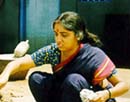
The mystique of Mangamma
D Jose

|
Revathy in Mangamma
Click for bigger pic!
|
It would have been another run-of-the-mill
sob-and-sigh
film in the hands of an ordinary film-maker. But with
national award-winning director T V Chandran calling
the shots, Mangamma
has become a powerful tale on celluloid.
"I am presenting not a film, but a woman," that's how Chandran
introduces his work.
The introduction aptly sums up the film, which is the story
of an ordinary woman who has
to fight for her survival. Mangamma represents the
typical Indian
woman for whom life is a battle with
odds all along.
Chandran, who won the national award for best director
in 1994, was inspired
by a woman, Mangamma, he came across in Palakkad in
the early 1980s. "What struck me most was
the way she toiled without complaints. There
was a strange calmness in her face," he recollects.
The woman's name stirred Chandran's creative
instincts. Though the meeting haunted
him into writing
the script in 1986, he could not immediately find a producer.
It was a dream come true when the National
Film Development Corporation
and Doordarshan agreed to jointly produce the film.
Although Chandran refuses to term the film his masterpiece, or even a
dream project, he concedes that Mangamma has given him a lot of
satisfaction. "It is a true tribute to the Indian
women," he says.

|
T V Chandran Click for bigger pic!
|
Mangamma's storyline has nothing unusual about
it. It has all the cliches
of an ordinary film. The story unfolds with Mangamma, played by Revathy,
setting out with her aged father (Thilakan) in search of job
and shelter after she loses her
younger sister in a tragic incident.
They come across a kind teashop owner in a village, and decide to
settle down there. Soon Mangamma
loses her father. The teashop owner marries her. Her old lover
who had promised to marry her on his return from military service
lands up at the village and
settles down without
causing any trouble.
The village life loses its rhythm when a real estate developer descends
there,
with all powers at his command. He wants to evict the teashop owner
and others
who have no title deeds. What ensues is a clash, in which
the police joins the side of the real estate baron. The teashop
owner succumbs to police torture. An orphaned boy whom
the man had adopted runs away and joins a revolutionary
movement. Mangamma refuses to be cowed
down, she fights on...
What sets apart Mangamma
from other feminist films is the grit and tolerance that
the main character exhibits.
Mangamma has been portrayed as a down-to-earth
woman capable of carving her own destiny.
"She is a no-nonsense woman," says Revathy, who expresses
herself most
impressed by the heroine's tremendous strength of character "It is a welcome relief
for
me since I was forced to survive through dance, looks, and the way I presented myself."
Revathy remembers she was quite sold on the film as soon
as Chandran narrated the script to her. In almost
all Chandran's films you see a striving to unravel
the mystique of women. Mangamma is a continuation of
that effort. It is, in a way, reminiscent of
his Alicine aneswanam
which was the sole Indian entry at the 1990
international film festival. The latter was more metaphorical.
Mangamma
is a stronger character than Alice. While Alice, coming from a
middleclass family, had
more time to introspect, Mangamma cannot afford those luxuries
because her main concern is her daily bread. Mangamma
is never shown in a pensive
mood in the film -- there are no slow
tracking shots or close-ups of her.
"She is a combination of
different women I have met in my
life," Chandran says, "There are many Mangammas amongst us but
we fail to understand them and their struggles because we look
at them from a higher pedestal."
The role of women is also
strong in Chandran's other films
like Ormakal undayirikanam
which won him the national award for the best Malayalam film in 1996,
and Ponthanmada which brought him the best director's award.
Chandran is a film-maker who does not hide his
political affiliations.
He was influenced
by the revolutionary zeal of the
Left movement. While many of
his contemporaries have almost faded out, Chandran's creative stream
continues to flow despite the prohibiting cost of
modern films. What keeps him going where others have failed is
perhaps his refusal to allow his political predilections dominate
his work. His concerns over the liberation struggle
which brought down the first democratically-elected Communist
government in Kerala, and the Emergency find reflection in this
film as well.

|
Revathy in Mangamma
Click for bigger pic!
|
But the political elements in the story is inextricably
woven into the main theme. The teashop owner's death in police custody and
the decision by the orphaned boy to join the revolutionary movement describes
the horrifying truths of the Emergency poignantly.
Chandran has blended all elements of a typical film into his
creation. The music, songs and photography,
are as powerful as his
characters. Sunny Joseph who handled cinematography has
imbibed Chandran's
novel idea very skillfully. His approach to the film is direct --
there are no hidden meanings behind
frames, no confusing symbols that one finds
ever-so-many in the so-called art films. The film-maker has
shown a rare insight into
the way the characters
think and live. And, thus, managed to make
Mangamma delightfully earthy
and honest.
|